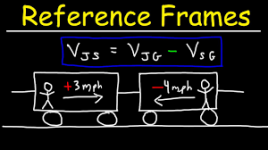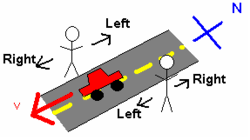I think you meant to say "... when an argument uses ambitious language or nuclear terms to confuse or misinterupt the audience"
It's a means to deceive an audience.
I think you meant to say "... when an argument uses ambitious language or nuclear terms to confuse or misinterupt the audience"
Support your claim.The clocks that a based on sound waves, as per the video, are also deceptive.
I see nothing about it that is irrational. On the contrary, contradictions do not exist in reality and these phenomena have been experimentally observed to happen and very very complex and hyper-expensive scientific instruments have these effects very intentionally engineered into the way they work because they wouldn't work at all otherwise.If we just accept everything that's presented in the videos then there is nothing to debate, correct?
Particle theory, aka, time and material dilation, is counter intuitive, aka, irrational, correct?
Why? Why, what?I would suppose that we should understand why.
All motion is relative.Lets begin at the beginning, there is no such thing as a moving clock vs a stationary clock. If any one thinks there is, please explain.
How so?The clocks that a based on sound waves, as per the video, are also deceptive.
There is experimental proof that they do not do so.All watches and clocks in a given time zone will all give the same time regardless of being in motion or stationary.
Maybe I need to rewatch the video because what you are describing as an objection sounds to me like the point they were making. The idea is to give an explanation for what we observe without resorting to time being an ontological thing that is somehow changing.A sound wave in a clock in motion, as per video, must travel a greater distance than the sound wave in the clock that is stationary so obviously it takes more time-more than a second. But there is a "false equivalence" between the two clocks. The moving clock is subject to--affected by--the "air" but the stationary clock is not. The speed of the sound wave is the same in both clocks but distance the wave travels is not the same for both clocks so they are not equal in the number of clicks. Time has not been shortened or lengthened the number of clicks are not the same because the distance is not the same. Sound waves travel through space not through time. Time has not been altered in this illustration between the two clocks, the distance the sound waves must travel has been altered between the two clocks, which creates a false equivalence. Time has not been altered if the distance is not the same between the waves moving at the same speed.
Now it is you who are making a false equivalence. A clock is not time. Time is not a clock. Motion effects clocks, not time. Time is not a thing, it is an idea and cannot be effected my physical forces. Clocks, on the other hand, can be and are.All watches and clocks in a given time zone will all give the same time regardless of being in motion or stationary.
There is experimental proof that they do not do so. --Clete
Right now in New Jersey it's not the same time for everyone?


This is the conventional understanding of time dilation. The videos are there to present another view."Time dilation is a physical phenomenon in which time moves differently for different observers in the same inertial frame. In time dilation, time moves slower for an observer who is in motion relative to another observer."--Google
It is 100% entirely and totally about nothing else but the clocks.
It isn't about distances. The effect on the clocks are quite real and cannot be ignored if we want certain technologies we use every day to actually work. GPS satellites are moving quite fast relative to the surface of the Earth and, as a result, their clocks run more slowly. That difference has to be accounted for or else the errors that happen would be significant and noticeable to the point that the system would be unusable because, when you are talking about distances on a planetary scale, it doesn't take much of an error to cause your position reading to be off by quite a long ways. If you sent your GPS guided bomb to blow up the terrorist's compound and it destroys the hospital two miles down the street, that's a bad day! The reason that doesn't happen is because the relativistic effects on those GPS satellite clocks are very precisely accounted for.View attachment 12239
I'm arguing that time does not slow down or speed up. The examples that attempt to show that it does are about distance not about time.
Very true but they are interestingly similar concepts. They are nearly identical concepts applied to two different aspects of reality. One has to do with the position of objects relative to other objects (space) the other has to do with the sequence of events relative to other events (time). It is this similarity that allows them to be treated as though they are the same thing mathematically. The error comes from accepting mathematics as reality without proper foundation.Space and time are not the same thing.
GPS is just one very relatable example of a system that is effected by relativity.Are we debating GPS or special relativity? Do you think they are the same thing?
Everything!GPS is a radio wave, "a type of electromagnetic wave that transmit and receive messages." What does it have to do with special relativity?
Again, it really seems like you've not watched the videos."In the context of special relativity, time cannot be separated from the three dimensions of space, because the observed rate at which time passes for an object depends on the object's velocity relative to the observer. General relativity provides an explanation of how gravitational fields can slow the passage of time for an object as seen by an observer outside the field."
I'm arguing that time "can" be separated from the three dimensions of space and the rate at which time passes for an object "does not" change for an observer outside the field.
The video is one attempt to explain special relativity in a different way but it still fails because a "moving clock" is not a valid way to measure time because the distance the waves travel through space in a moving clock is not the same distance as in the stationary clock.
That is NOT so!My watch if I'm on a moving train will tick to the same seconds, minutes, and hours just as the clocks say in every town I pass by.
Saying it doesn't make it so. You really should take the time to re-watch the videos. It is clear that you missed major points and/or misunderstood the arguments made.All illustrations of how time expands or contracts are flawed.
You really aught to just use the "quote" feature.Clete: "A clock is not time. Time is not a clock. Motion effects clocks, not time. Time is not a thing."
No. Time does not exist at all except as a concept inside a thinking mind. Time is an idea. It is a convention of language that is used to communicate information related to the duration and sequence of events. It is nothing at all other than comparing one event to another; talking about one event in terms of other event (or set of events).Time is not a thing "in itself". Time exists because a material world exists. Time exists in eternity because God exists and he does things. If God and a material world did not existed then neither would time.
Time is nothing at all other than speaking about that motion in terms of other motion. A "motion" of any sort, is just an event. If you talk (or just think about) that event in relation to some other event then, by doing so, you are employing the concept of time.Motion in God and motion in the world is one of the reasons time exists, time is not what is in motion.
Clocks, on the other hand, do speed up or slow down.Time does not speed up or slow down, a train speeds up and moves through space a farther distance than a train that is stationary or not moving as fast.
No, that's entirely wrong.Special relativity means time travel is possible,
That's because there isn't any such ontologically real thing as the past or the future. Both are ideas and do not exist at all outside a thinking mind. Nothing ever leaves the present - period. This is a point that I hammered for weeks on end in the Summit Clock Experiment thread.but in reality nothing (not even God) moves into the future ahead of anything else, and nothing (not even God) gets left behind in the past.
I agree that modern scientists have gone off the deep end with regard to time travel (traveling in some direction through time other than into the future) but it isn't actually relativity that makes them think its possible, (except in the context of a very liberal definition of "time travel" as is given in that article that you linked to)."Before the twentieth century, scientists and philosophers rarely investigated time travel, but now it is an exciting and deeply studied topic...The most attention is paid to time travel that is consistent with current physical theory such as Einstein’s general theory of relativity." https://iep.utm.edu/timetrav/
The second video in the opening post ends with a "to be continued". Do you know whether this video that you've linked to is the next video in the series? Their YouTube channel doesn't make it overtly clear which is intended to be the next in the series.A related video that I found very interesting:
